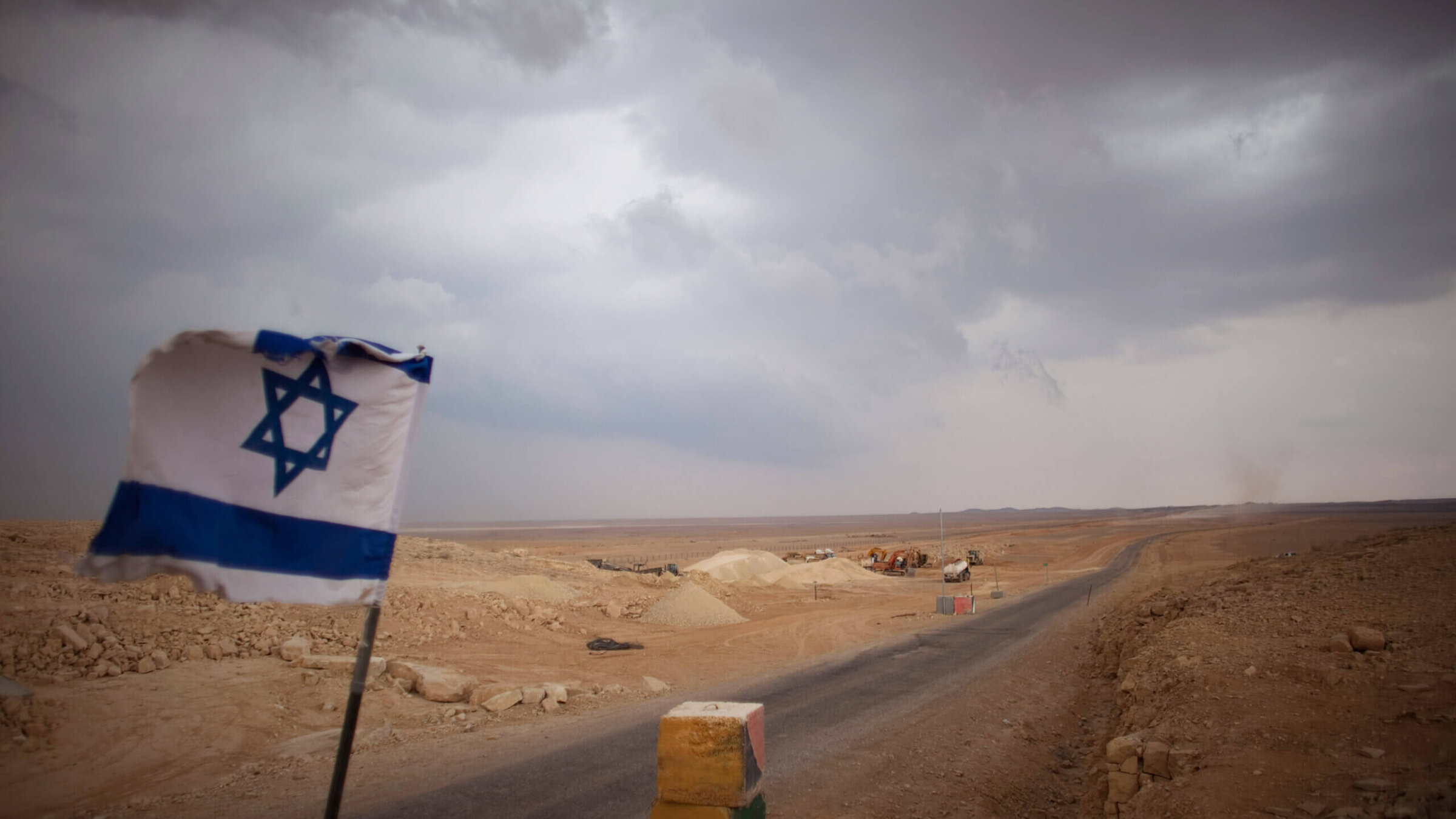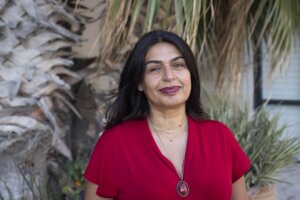As Israel turns 75, I remember what I had to sacrifice to become a ‘good Israeli’
In order to be accepted in Israel, I had to deny my Iranian identity

An Israeli flag flies at a checkpoint at the Israeli Egyptian border on February 10, 2011 in Israel. Photo by Uriel Sinai/Getty Images
This op-ed has been translated from the original Hebrew by David Hazony.
I remember clearly the first time I stood before the walls of the Old City in Jerusalem, outside Jaffa Gate. To a 9-year-old girl who only a week earlier had immigrated with her parents to Israel, it seemed as though images I had seen before, on postcards sent by relatives in Israel to our home in Iran, had suddenly come to life. I was standing in a fairy tale. I could almost see glowing halos over the heads of the soldiers and police officers.
Who could have imagined then that three decades later, I would be demonstrating regularly against the presence of the very same soldiers and police officers, in the very same place. That I would protest against the privileges I had received, as a Jew, even before I had set foot in this land — rights not granted to Palestinians who had lived here for generations. That I would protest against the colonialist trap of a “Jewish and democratic” state, which binds the fate of Palestinians and Mizrahim as one.
On my first day at my new school, I had to change my first name, Mozhgan, to something in Hebrew. This was the Israeli “melting pot,” the first of many ways I would be compelled to shed the components of my identity to become a “good Israeli” — which, at the time, was my central mission in life.
We made our home in the Jerusalem neighborhood of French Hill, a settlement created on land annexed by Israel after 1967, adjacent to the Palestinian neighborhood of Isawiya. No concrete wall separated these two neighborhoods, but an abyss nonetheless stood between them. The children of Isawiya were not part of my landscape. I don’t think we even knew they existed, and we certainly knew nothing of their awful standard of living, the crowdedness, the poverty or the clenched fist that ruled over every aspect of their lives.
Despite living in a city with a mixed population, my first conversations with Palestinians took place only when I was a student at the Hebrew University. That was when the first cracks appeared in the Zionist narrative my parents adopted when we arrived in Israel, a narrative applied retroactively to our time in Iran after our immigration. It was only after we came to Israel that my parents began saying they had always been ardent Zionists, that their plan had always been to move to Israel when my brother and I finished school, a plan that we had never heard of in our childhood. I have no doubt that if not for the Islamic Revolution in 1979, they would never have left.
It was also in college that I was first exposed to the Mizrahi discourse. I took a course with Professor Sami Shalom Chetrit, “Mizrahi Politics in Israel,” which quickly became a new pair of glasses through which I suddenly could see how it was that we Mizrahim were at the bottom of the socioeconomic ladder, blocked from the most important circles of influence. That it was no coincidence, but rather a result of policy.
In college, my exposure to both the Palestinian struggle and the Mizrahi struggle changed fundamentally how I understood the reality of Israel. It allowed me to put into words that which until then I had no more than an inarticulate feeling: That there is an inherent contradiction between Israeli and Middle Eastern identity, and that in order to be accepted as a “true” Israeli, I would have to deny my Iranian identity, to be ashamed of it. Over time I have learned just how formative an experience this is for the Mizrahi community.
The former Israeli prime minister Ehud Barak once described Israel as “a villa in the jungle.” This careful expression reveals a great deal about Israel’s self-perception, about the hostility with which it looks at the wide expanse around it. About its profound refusal to accept the truth of its geopolitical location, even after 75 years.
Anyone who looks out the window of this villa and sees only “the jungle” is destined to live in fear. One who looks out in terror and disgust sees terror at the wild beyond, disgust at the barbarians living “out there.” This captures exactly how the Israeli Zionist looks at the people of the Middle East, Jews and Arabs alike. When your formative experiences are of terror and disgust, you build the highest possible walls — both physical and mental — around your villa.
We, Mizrahi Jews of Israel, were allowed entry to the villa because we possessed a magical key to its gates — namely, because we were Jews. But from the moment we arrived, that same disdain, explicit or implicit, reminded us constantly that we had to prove we were worthy of being there. That we weren’t like those “jungle people.” I can’t count the number of times I was asked if the house we lived in in Tehran was made out of clay, or if I had ever seen an elevator in Iran — questions that imagined Tehran as an impoverished village. In reality, Tehran of the late 1970s was a far more bustling, modern city than anything Israel offered at the time. This was more than just ignorance. It was profound arrogance.
The Mizrahim were offered a cruel bargain: Abandon any memory of where we had come from, deny our language, historical memory and culture, and in exchange we’d get the opportunity to struggle to improve our lot in the villa — but only between the basement and the kitchen. The fact that for 75 years, we have never had a Mizrahi prime minister, that Mizrahim suffer to this day from underrepresentation in centers of power like the Supreme Court, that we populate the social and geographical periphery — all of this is no coincidence. It is the result of deliberate structures of hierarchy and power.
Over the years, the Israeli establishment, from the days of Mapai (the original party that became the Labor Party today) until now, did everything it could to pit Mizrahim and Palestinians against each other — whether by settling immigrants in the homes of Palestinians who had fled the Nakba, or to make us fight over the crumbs at the bottom of the socioeconomic ladder, or by encouraging Mizrahi hatred towards Arabs as a way to prove we weren’t like them. Yet in truth our oppression has the same source: namely, the Zionist-orientalist view of the Middle East and its people. The Palestinians suffer from this worldview infinitely more, but our interests in freeing ourselves from this oppression are aligned.
This is why I have been active for years in Balad, the Palestinian national democratic party and why I translate Persian literature into Hebrew: an act of political resistance aimed at fighting the erasure of our Middle Eastern mother culture.
Life in an imaginary villa is pitiful, isolating and violent. The profound reckoning Israel needs cannot happen within its walls. Rather, we must first tear down the walls of the villa, and erect in their place a new building made from locally sourced stones, open to the expanse beyond, one that will stand on foundations of equality, justice, citizenship and substantive democracy, and not on fear, supremacy and isolation.
Our future depends on this, in the most literal way possible. After so many years of insulation, the oxygen in the villa is running low.
To contact the author, email [email protected].
A message from our Publisher & CEO Rachel Fishman Feddersen

I hope you appreciated this article. Before you go, I’d like to ask you to please support the Forward’s award-winning, nonprofit journalism during this critical time.
We’ve set a goal to raise $260,000 by December 31. That’s an ambitious goal, but one that will give us the resources we need to invest in the high quality news, opinion, analysis and cultural coverage that isn’t available anywhere else.
If you feel inspired to make an impact, now is the time to give something back. Join us as a member at your most generous level.
— Rachel Fishman Feddersen, Publisher and CEO























